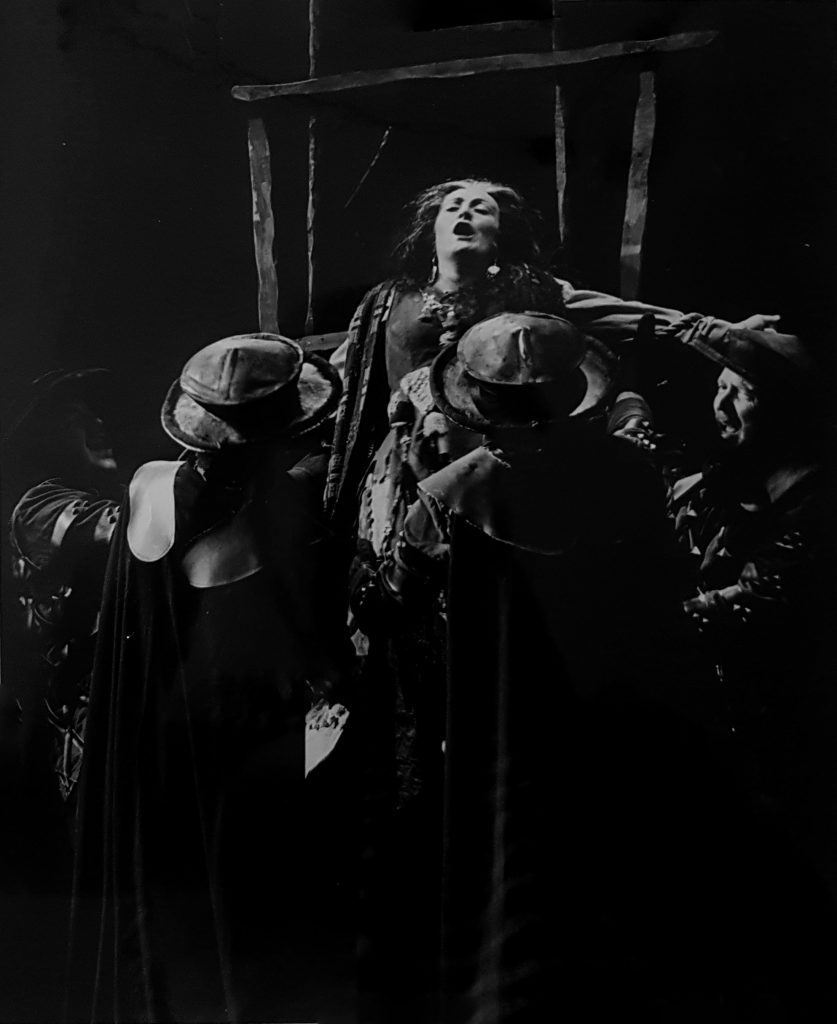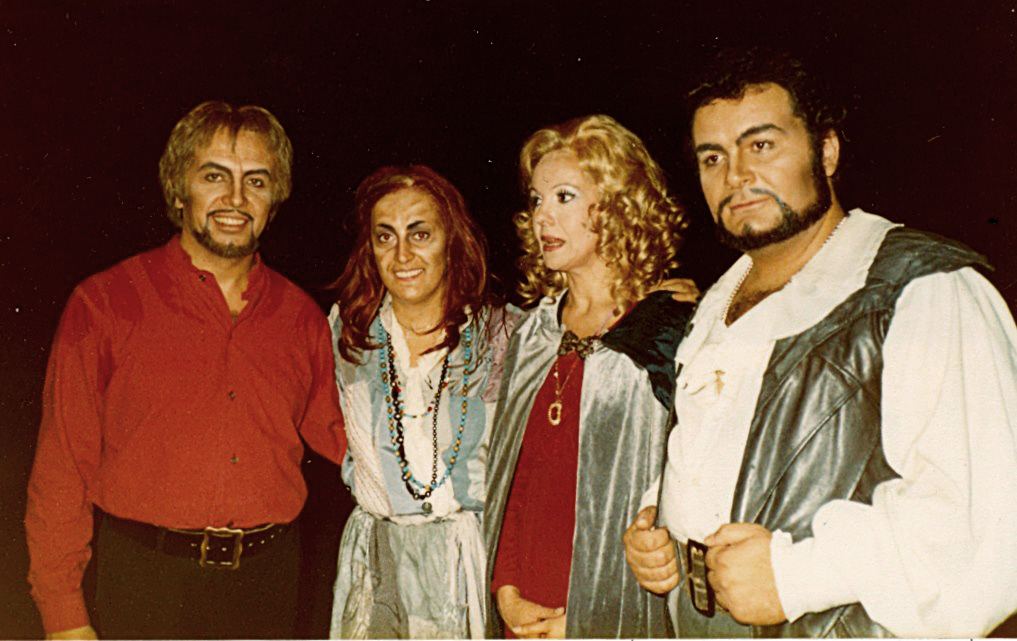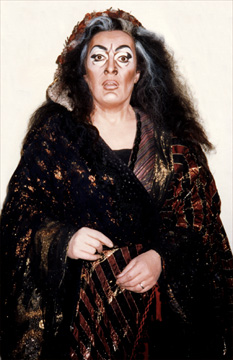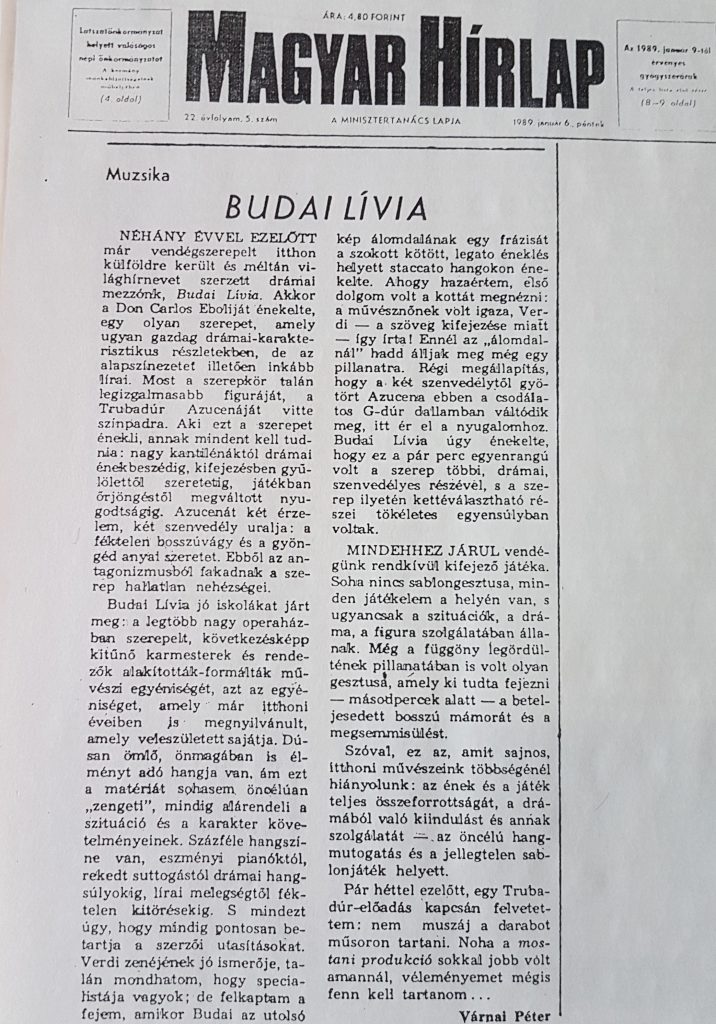Azucena
Verdi: Il Trovatore
Pictures
Recordings
Performance History
<<< on mobile device please swipe the table to scroll >>>
Year |
City |
Cast |
Stage |
Conductor |
|
1977 |
VARNA |
|
|
|
|
1978 |
GELSENKIRCHEN |
Todorova, Conney, Mora |
Järvefelt |
Mund |
|
1978 |
FRANKFURT |
Maruyama, Swetlew, Constantin |
Fricsay |
Falk |
|
1979 |
GELSENKIRCHEN |
Ricciarelli, Merighi, Boyagian |
Järvefelt |
Mund |
|
1979 |
HAMBURG |
Kabaivanska/Arroyo, Lamberti, Weikl |
|
Santi |
|
1980 |
FRANKFURT |
Evstatieva, Lazzaro, Mora |
Fricsay |
Binder |
|
1981 |
MÜNCHEN |
Evstatieva, Lloveras, Brinkmann |
Poettgen |
Fischer |
|
1981 |
HAMBURG |
Varady, Murgu, Brendel |
|
Santi |
|
1982 |
VENICE |
Castro-Alberty Garaventa, Boyagian |
Fassini |
Maag |
|
1982 |
MANNHEIM |
Kabaivanska, Murgu, Nucci |
Mehring |
Veltri |
|
1983 |
BERLIN |
Gavazza, Ruohonen, Fortune |
Karajan |
Kulka |
|
1984 |
MÜNCHEN |
Plowright, Lamberti, Brendel |
Poettgen |
Patané |
|
1984 |
BERLIN |
Falcon, Merighi, Fortune |
Karajan |
Soltész |
|
1984 |
BRUSSELS |
Mitchell, Mauro, Miller |
Constant |
Schonwandt |
|
1984 |
TORONTO |
Castro-Alberty, Mauro, Monk |
Mansouri |
Kellogg |
|
1985 |
BERLIN |
Falcon, Gugalov, Nucci |
Karajan |
Gomez-Martines |
|
1987 |
NEW YORK – MET |
Sutherland, Pavarotti, Nucci |
Melano |
Bonynge |
|
1988 |
NEW JERSEY |
Ligi, Bonanome, Pasquetto |
Guttman |
Silipigni |
|
1988 |
DETROIT |
Mitchell, Bartolini, Dietsch |
Lata |
Alfieri |
|
1988 |
BUDAPEST |
Tokody, Kelen, Kálmándi |
Vámos |
Morandi |
|
1992 |
ESSEN |
Culmer-Schellbach, Pulznikov, Szilágyi |
|
Humburg |
Reviews
“Appearing here for the first time, Miss Budai has the advantage of a role which suits her well, for she can both act and sing with vengeful spite while allowing the gypsy’s more tender feelings at times to show through the strident glare of her tone.”
Paul Griffiths, THE TIMES, March 1978, London
“Miss Budai is a find: a contralto with a voice of lovely dark colour… Miss Budai’s acting was as involved as the tepid surroundings would allow. She has striking features.”
Ronald Crichton, FINANCIAL TIMES, March 1978, London
“…very musical phrasing (“Ai nostri monti” was most beautifully done) had revealed a singer of exciting promise.”
David Cairns, THE SUNDAY TIMES, March 1978, London
“Lívia Budais Azucena, die zur dominierenden, zentralen Gestalt des verworenen Schauer-dramas wurde, suggestiv in jeder Facette, zugleich dömonischbedrohlich, ungestüm, zärtlich und mitleidheischend – mit einem phänomenal sonoren Mezzo, der ein Naturereignis ist.”
Gábor Halász, RHEINPFALZ, October 1982, Mannheim
” In der lebendigen Personenführung von Pierre Constant stand Livia Budai an der Spitze. Sie war eine wilde, leidenschaftliche Azucena.”
OPERNWELT, May 1984, Brussels
” Verdis Oper hat mich so berührt, dass ich insgeheim eine Umbenennung in “AZUCENA” – melodramma in quattro attivornahm, denn LIVIA BUDAI ist es, die den stärksten Eindruck hinterlässt. Eine hervorragende Schauspielerin!”
OPERNGLAS-RUNDBLICK, February 1984, Brussels
“eine hervorragende Interpretin fand. Mit ihrem raumfülenden, technisch glanzvoll geführten, dunkeltimbrierten Mezzosopran…
…vermochte diese hochdramatische Akzente liebende Sängerin nicht nur stimmlich, sondern auch durch temperamentvolle Körpersprache Bühnenpartner und Zuschauer in ihren Bann zuziehen.”
Dr. Wolfgang Alte, MERKER – WIEN 1984, Brussels
“…elle fait d’Azucena, avec la complicité de Pierre Constant, la véritable Héroine du drame: panthére blessée, mére vengeresse et pathétique.”
LE SOIR, February 1984, Brussels
“Livia Budai à donné un relief saisissant au grand rôle d’Azucena, la “mére” réputée sorciére du trouvére. Sa voix bénéficie d’une technique admirable, chaude et émouvante. Mme Budai est apparue comme une grande tragédienne lyrique.”
LUXEMBURGER WORT, February 1984, Brussels
“Signalons qu’il fait un triomphe à l’Azucena de Livia Budai; cette merveilleuse interprète, telle une braise ardente, a trouvé le moyen de libérer et d’épanouir tous ses sortiléges de comédienne: le feu d’une vengence inéluctable, la passion tumultueuse d’une mére déchirée.”
LE SOIR, February 1984, Brussels
“The Hungarian mezzo Lívia Budai as the gypsy Azucena dominated every scene she was in with her powerful acting and strong expressive voice.”
THE LONDON FREE PRESS, October 1984, Toronto
“Only Lívia Budai offered anything near a complete performance as the gypsy Azucena, providing real drama in her first scene by the campfire, and augmenting her rich, powerful voice with a sense of urgency that made the evening really worth caring about.”
THE GLOBE AND MAIL, October 1984, Toronto
“She was electrifying: her actions as wild as the drama calls for, her singing effortless, yet stirring, her dominance of the stage complete…”
Arnold Edinborough, THE FINANCIAL POST, October 1984, Toronto
“Livia Budai wurde als Azucena vielleicht in ihrem Bewegungsradius zu sehr beengt, doch verstand gerade sie es, Dämonie, Leidenschaft und Ekstase vorwiegend vokal und mit wenigen, dafür aber eindringlichen Gesten zu verdeutlichen. Ausserdem sang sie so zentriert, dass sie sich dem Deutungsstil Richard Bonyoges ideal anpasste – eine grossartige Leistung, die auch mit entsprechenden Ovationen bedacht wurde.”
ORPHEUS, February 1988, New York
“Lívia Budai animates State Opera’s Trovatore.
There’s no middle ground with La Budai. She personifies a fierce division within the opera world that dates back to the Callas versus Tebaldi days, at least, and actually much further back than that. It has to do with the very essence of opera singing. Budai’s Azucena is one of the most sensational characterizations this operagoer has ever seen. It is a throwback to a bygone era, an era preserved in certain primitive recordings that also reveal liberties in pitch… Budai appears to take a kamikaze approach to the role of Azucena. In other words, you risk everything, and if you go down at least you go down in flames. The intensity and vividness that she was able to generate, both vocally and dramatically, were such as to make the other singers look like cardboard cutouts in comparison… The phenomenon of singers such as such as Budai (and they are rare these days) poses another question entirely. Could it be that opera is actually about something much more mysterious than correct and beautiful singing – such as the transformation of words, music and character into a source and focus of spiritual power?…”
Michael Redmond, THE STAR-LEDGER, March 1988, New Jersey
“Mezzo-soprano Lívia Budai, formerly of the Metropolitan Opera, was truly stunning as the half-crazed gypsy Azucena. She possesses a throaty lower range that roared, snarled and growled its way through one of the great character roles in all of opera. Her makeup was also tops, giving her the appearance that put the creative icing on the role.”
Peter Edward Franks, THE COURIER-NEWS, March 1988, New Jersey
“Among the principal characters, Budai as Azucena certainly deserved top honors for a performance of incredible emotional and musical power and impact. Budai made her State Opera debut in the role on Sunday. Her contralto voice was projected wonderfully, and her command of all dramatic aspects of the role was exceptional.”
Rena Fruchter, THE HOME NEWS, March 1988, New Jersey






















